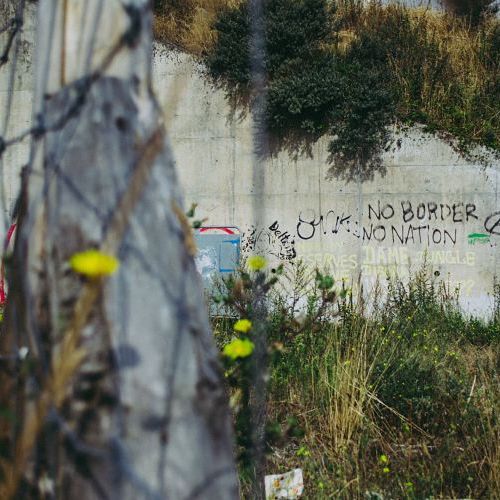Three years after Europe declared a ‘crisis’ of migration control, its border and migration regimes have become increasingly repressive. A growing body of critical scholarship is attending to these dynamics and their effects, examining gaps between policy and practice, intended and unintended consequences, and the harms and suffering these migration regimes produce.
Our list of books traces how this European migration regime comes into being and the different ways in which it is practiced throughout its internal and external border landscapes and affects the lives of migrants.
The collection The Borders of Europe: Autonomy of Migration, Tactics of Bordering, edited by Nicholas De Genova, examines the declared ‘crisis’ of Europe’s borders and the effect of militarized border enforcement on migrants who try to exercise their freedom of movement. The collaborative ethnography Migrants before the Law: Contested Migration Control in Europe by Tobias Eule, Lisa Marie Borrelli, Annika Lindberg and Anna Wyss analyses Kafkaesque migration control practices in the Schengen area via an ethnography of the everyday contestations over migration law enforcement across eight states. Similarly, Anna Tuckett’s Rules, Paper, Status explores how migrants’ inclusion and exclusion is negotiated in the everyday workings of migration law inside Italy’s migration bureaucracy. Katerina Rozakou’s monograph Out of “love” and “solidarity” turns the lens towards the role of civil society in reproducing and contesting these boundaries by analyzing various forms of voluntary work with refugees in Greece. In Gendered Harm and Structural Violence in the British Asylum System, Victoria Canning traces how structural violence is enacted within the British asylum regime and its harmful effects, using an intersectional lens. These border regimes importantly extend beyond their geographical delineations: Gender, Violence, Refugees by Susanne Buckley-Zistel and Ulrike Krause, which explores gender dynamics in the context of displacement, brings additional, important perspectives from across the world, and After Deportation: Ethnographic Perspectives, edited by Shahram Khosravi examines what happens to migrants after deportation from Europe.
Our review guidelines:
As we receive many requests for reviews, please write 2-3 sentences why you should be reviewing this book, indicating how it relates to your own research or interests.
Please send your expression of interest to: reviews@allegralaboratory.net
When submitting the review, please follow our guidelines:
The review is to be written within three months from the dispatch of the book.
Spelling: British English. Please use –ise and not –ize word endings.
Word limit: 750-1500 words.
Font: Times New Roman.
Size: 12.
Line Spacing: 1,5
No footnotes.
If you cite other authors, please reference their publication in the end.
Do not forget to include your name, (academic) affiliation, a photograph of yourself and a short bio of 2-3 sentences.
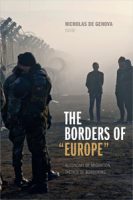
De Genova, Nicholas (ed). 2017. The Borders of “Europe”. Duke University Press.
In recent years the borders of Europe have been perceived as being besieged by a staggering refugee and migration crisis. The contributors to The Borders of “Europe” see this crisis less as an incursion into Europe by external conflicts than as the result of migrants exercising their freedom of movement. Addressing the new technologies and technical forms European states use to curb, control, and constrain what contributors to the volume call the autonomy of migration, this book shows how the continent’s amorphous borders present a premier site for the enactment and disputation of the very idea of Europe. They also outline how from Istanbul to London, Sweden to Mali, and Tunisia to Latvia, migrants are finding ways to subvert visa policies and asylum procedures while negotiating increasingly militarized and surveilled borders. Situating the migration crisis within a global frame and attending to migrant and refugee supporters as well as those who stoke nativist fears, this timely volume demonstrates how the enforcement of Europe’s borders is an important element of the worldwide regulation of human mobility.
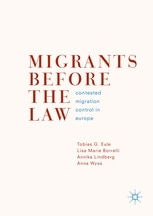
This book traces the practices of migration control and its contestation in the European migration regime in times of intense politicization. The collaboratively written work brings together the perspectives of state agents, NGOs, migrants with precarious legal status, and their support networks, collected through multi-sited fieldwork in eight European states: Austria, Denmark, Germany, Italy, Latvia, Lithuania, Sweden and Switzerland. The book provides knowledge of how European migration law is implemented, used, and challenged by different actors, and of how it lends and constrains power over migrants’ journeys and prospects. An ethnography of law in action, the book contributes to socio-legal scholarship on migration control at the margins of the state.
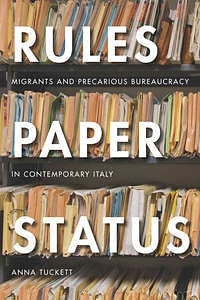
Whether motivated by humanitarianism or concern over “porous” borders, dominant commentary on migration in Europe has consistently focused on clandestine border crossings. Much less, however, is known about the everyday workings of immigration law inside borders. Drawing on in-depth ethnographic fieldwork in Italy, one of Europe’s biggest receiving countries, Rules, Paper, Status moves away from polarized depictions to reveal how migration processes actually play out on the ground. Anna Tuckett highlights the complex processes of inclusion and exclusion produced through encounters with immigration law.
The statuses of “legal” or “illegal,” which media and political accounts use as synonyms for “good” and “bad,” “worthy” and “unworthy,” are not created by practices of border-crossing, but rather through legal and bureaucratic processes within borders devised by governing states. Taking migrants’ interactions with immigration regimes as its starting point, this book sheds light on the productive nature of legal and bureaucratic encounters and the unintended consequences they produce. Rules, Paper, Status argues that successfully navigating Italian immigration bureaucracy, which is situated in an immigration regime that is both exclusionary and flexible, requires and induces culturally specific modes of behavior. Exclusionary laws, however, can transform this social and cultural learning into the very thing that endangers migrants’ right to live in the country.
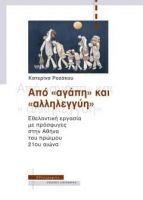
This monograph examines the construction of the volunteer as a moral Greek and European citizen in early 21st century Greece. Narratives of volunteerism and civil society that emerged at that time echoed the modernisation and Europeanisation visions of Greek society. The volunteer emerged as the epitome of the modern citizen, a disinterested subject working voluntarily for the common good. Yet these projects remained fragmented and incomplete in Greece. A certain “lack of volunteerism” was broadly attributed to Greek exceptionalism. The book challenges this dominant hypothesis regarding the presumed underdevelopment of volunteerism and suggests an alternative analytical approach. It shows how the attempts to regularise and institutionalise volunteerism conflicted vernacular forms of public sociality. Based on fieldwork in two associations, the Hellenic Red Cross and Voluntary Work Athens, this ethnographic study explores two different versions of volunteerism, humanitarian and militant volunteerism and their historical genealogies.
Out of “love” and “solidarity” focuses on voluntary work with refugees and on the political production of relationality. The book explores the relationships between refugees and residents of Greece who tried not only to help them, but also to incorporate them in culturally significant forms of social interaction. The monograph unearths “love” and “solidarity” as key formative concepts of public sociality. Drawing upon the anthropological discussion on the gift, this study explores the ways in which the relations between the volunteers and the refugees reproduce, contest and transform dominant modalities of dealing with the “other” such as hospitality.
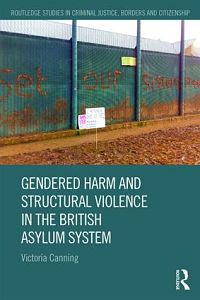
Britain is often heralded as a country in which the rights and welfare of survivors of conflict and persecution are well embedded, and where the standard of living conditions for those seeking asylum is relatively high. Drawing on a decade of activism and research in the North West of England, this book contends that, on the contrary, conditions are often structurally violent. For survivors of gendered violence, harm inflicted throughout the process of seeking asylum can be intersectional and compound the impacts of previous experiences of violent continuums. The everyday threat of detention and deportation; poor housing and inadequate welfare access; and systemic cuts to domestic and sexual violence support all contribute to a temporal limbo which limits women’s personal autonomy and access to basic human rights.
By reflecting on evidence from interviews, focus groups, activist participation and oral history, Gendered Harm and Structural Violence provides a unique insight into the everyday impacts of policy and practice that arguably result in the infliction of further gendered harms on survivors of violence and persecution.
Of interest to students and scholars of criminology, zemiology, sociology, human rights, migration policy, state violence and gender, this book develops on and adds to the expanding literatures around immigration, crimmigration and asylum.
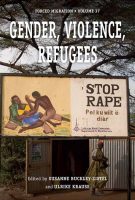
Buckley-Zistel, Susanne, and Ulrike Krause. 2017. Gender,Violence, Refugees. Berghahn Books.
Providing nuanced accounts of how the social identities of men and women, the context of displacement and the experience or manifestation of violence interact, this collection offers conceptual analyses and in-depth case studies to illustrate how gender relations are affected by displacement, encampment and return. The essays show how these factors lead to various forms of direct, indirect and structural violence. This ranges from discussions of norms reflected in policy documents and practise, the relationship between relief structures and living conditions in camps, to forced military recruitment and forced return, and covers countries in Africa, Asia and Europe.
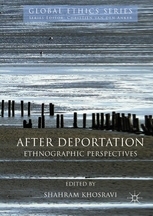
This book analyses post-deportation outcomes and focuses on what happens to migrants and failed asylum seekers after deportation. Although there is a growing literature on detention and deportation, academic research on post-deportation is scarce. The book produces knowledge about the consequences of forced removal for deportee’s adjustment and “reintegration” in so-called “home” country. As the pattern of migration changes, new research approaches are needed. This book contributes to establish a more multifaceted picture of criminalization of migration and adds novel aspects and approaches, both theoretically and empirically, to the field of migration research.
Featured image by Radek Homola on Unsplash

